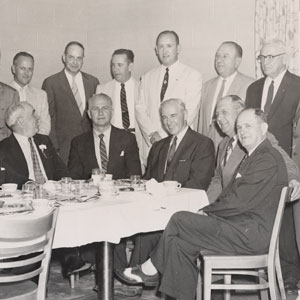
Following the Supreme Court's Brown v. Board of Education ruling that "separate but equal" facilities in public schools were unconstitutional, North Carolina's Jim Crow school system faced serious challenges going forward. Several southern states, including Alabama, South Carolina, and Virginia, initially declared open resistance to the ruling. North Carolina pursued a more moderate, convoluted, seemingly compliant approach, but one ultimately declared unconstitutional. In 1955, the year after Brown v. Board of Education, Governor Luther Hodges (1898-1974) appointed an Advisory Committee on Education, chaired by Thomas Pearsall (1903-1981), to formulate a strategy. The result was the "Pearsall Plan," which recognized the Supreme Court's decision, but then allowed (1) tuition payments for pupils to attend private schools if their parents objected to integrated schools, and (2) local school boards the option of closing public schools if integration caused "intolerable situations." An earlier advisory committee had unanimously agreed that immediate integration in the state was not feasible. The fear was that prompt integration would result in widespread resistance, including violence, compromising if not destroying the state's public school system.
The state legislature overwhelmingly approved the plan. Governor Hodges spoke widely in support of it, including delivering repeated TV and radio addresses. As part of Hodges' push to have the plan ratified, he and Pearsall visited Greenville and attended a luncheon hosted by ECC president John Messick. No doubt the subject was the Pearsall Plan. A group picture documented those in attendance and their reactions to the plan. Sitting at the table (left to right) are: Herbert Waldrop, ECC trustee; Dr. Leo W. Jenkins, ECC vice president; Arthur Tyler, ECC trustee; Governor Luther Hodges; Thomas Pearsall; Dr. John Messick, ECC president; Edwin E. Rawl, ECC trustee; Paul Jones, state senator. Those standing are (left to right): David Julian Whichard, publisher of the Daily Reflector; Frank Wooten, state representative; John G. Clark, chair of the Pitt County Democratic Party; Frank Copeland, local businessman; L. H. Ross, state senator; Jack Spain, administrative assistant to U.S. Senator Sam Ervin; Cliff Everett, Sr., attorney; Charles Bissette, local businessman; Ralph Hodges, ECC trustee; and James Butler, ECC alumni secretary.
ECC president John Messick's support for the Pearsall Plan, as well as that of other representatives of East Carolina College and the community, is apparent. When the state of North Carolina voted on the plan as an amendment to the N.C. constitution, it was approved by a nearly five-to-one margin. In 1966, however, a federal court ruled the Pearsall Plan unconstitutional. While criticized as an overtly compliant strategy that effectively allowed for Jim Crow segregation, the Pearsall Plan also issued from a fear of violence from those rabidly opposed to the prospect of immediate integration. When communities such as Charlotte later attempted, along very progressive lines, to desegregate promptly, severe white backlash led to failure and, in effect, even more prolonged segregation. In the end, there was no easy solution going forward, but surely a better course might have been found than one allowing for closing schools. That East Carolina's leadership endorsed the plan rather than find a more progressive path to desegregation reflects the extent to which white supremacist prejudices still dominated campus thinking in the mid-1950s.
Sources
- "Cooley, Fountain To Back Pearsall Plan." Rocky Mount Telegram. September 6, 1958. P. 1.
- Nisbet, Lynn. "Weary Governor Expects Heavy Turnout." The Robesonian. September 7, 1956. P. 1.
- "Pearsall Plan Approved By Wide Margin." Asheville Citizen-Times. September 9, 1956. P. 1.
- "Pearsall, Thomas J., 1955-1956." Series 5, Local Correspondence and Papers, 1947-1959, Box 5 Folder 22. Records of John Decatur Messick's Tenure as President of East Carolina Teachers College And East Carolina College. UA02-05. University Archives, East Carolina University, Greenville, N.C.
- "School Amendment Now Up To Voters." The Robesonian. September 7, 1956. P. 1.
- Thomas Jenkins Pearsall papers # 4300. Southern Historical Collection. Wilson Library. University of North Carolina at Chapel Hill.
Citation Information
Title: Desegregation Meeting
Author: John A. Tucker, PhD
Date of Publication: 7/18/2019